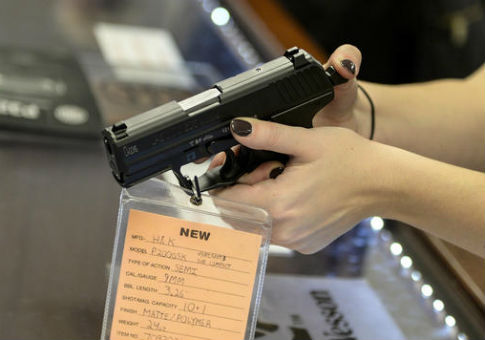An audit of the federal firearms background check system released on Wednesday found that prosecutions for individuals who illegally try to buy a gun from firearms dealers have fallen to a new low.
The Department of Justice inspector general's review of the National Instant Criminal Background Check System, or NICS, revealed rare but consequential mistakes by the FBI, a dispute between federal agencies that left thousands of gun purchases in limbo, and questionable policy decisions by federal prosecutors.
The report’s authors criticized a U.S. Attorneys’ Office policy not to prosecute people for lying on background check forms while attempting to illegally acquire a firearm. Investigators found that the office did not prosecute such cases unless they were accompanied by other charges.
"We determined that, in general, USAOs most often prosecuted NICS denial cases when aggravated circumstances existed in addition to the prospective purchaser’s false ‘no’ answer to at least one question on the Form 4473," the report said, referring to a common background check form for firearms purchases.
Prosecutors told Congress that "while the Department would prosecute particularly egregious false 'no' cases arising from NICS denials, it would prioritize prosecuting prohibited persons who actually obtained guns illegally as opposed to those who attempted to purchase a firearm by making false statements during the background process but were unsuccessful," according to the report.
The USAO said the decision not to prosecute background check-related crimes was the result of a shift in policy by the Obama administration following the Sandy Hook school shooting in 2012, but the report found the decline in prosecutions started as early as 2003.
That year, 166 people who the FBI determined had lied on a gun background check, which is a federal felony, were considered for prosecution by the USAO. The report said prosecutions "dropped substantially" after that point.
The report shows that, between 2008 and 2015, the FBI denied 556,496 gun purchases following background checks. During that time period, the report shows that only 254 false statements were even considered for prosecution, amounting to a 0.04 percent prosecution rate.
The report indicated that the USAO does not believe the low prosecution rate is a problem and has no plan to reconsider its policies.
The report also found that the FBI made consequential, if rare, mistakes in processing gun background checks.
Justice Department investigators found that the FBI’s denials of gun purchases were overwhelmingly appropriate, with an accuracy rate of 99.8 percent.
"Although we found the overall FBI error rate was exceedingly low, even an isolated NICS process breakdown can have tragic consequences, as evidenced by the June 2015 fatal shooting at a Charleston, South Carolina church, where the NICS process, with timely and accurate data from local agencies, could have prevented the alleged shooter from purchasing the gun he allegedly used," the report said. "A subsequent FBI Inspection Division (INSD) report attributed primary responsibility for the delay that allowed the firearm to be transferred to untimely responses and incomplete records at various state and local agencies that feed into NICS, a problem we identified more generally in our review."
Investigators found that in six background checks they examined, the FBI determined that the person attempting to purchase a firearm was prohibited from doing so but didn't inform the store processing the purchase for up to seven months. In another 59 cases, investigators say the FBI approved people who should have been denied.
The report also found state agencies that processed gun background checks through NICS didn't properly update information in the system or inform the FBI of the outcome of their checks in all but one of the cases examined. It stated that the FBI lacks a way to track whether all necessary evidence has been gathered for pending background checks. Nor does the bureau review a potentially important database—which had information that could have stopped the sale of the Charleston shooter's gun—during background checks.
